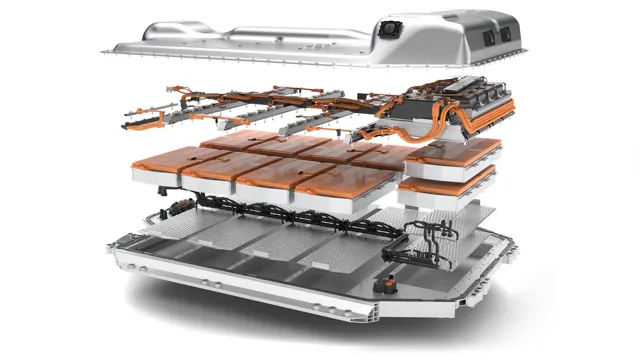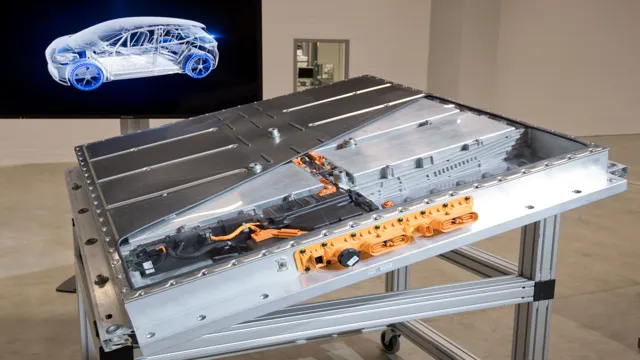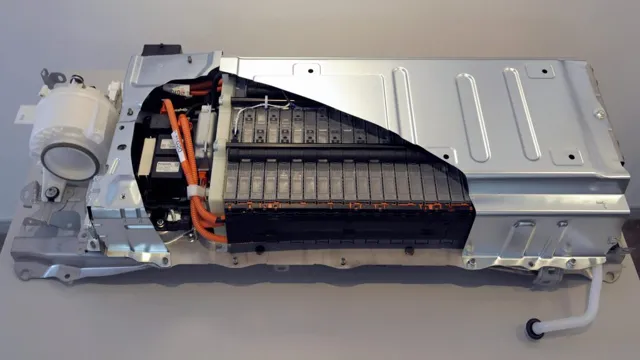Are Electric Car Batteries the Future of Sustainable Transportation? Exploring the Benefits, Drawbacks, and Emerging Technology
Electric car batteries are at the forefront of modern automotive technology. As the world seeks to transition toward cleaner energy sources, electric vehicles have been hailed as a solution to reducing carbon emissions and improving air quality. However, with the benefits of electric cars come many misconceptions and myths surrounding their batteries.
In this blog, we will explore the facts and myths about electric car batteries, from the range anxiety they allegedly cause to their price and charging capabilities. Join us as we debunk some of the most prevalent misconceptions and reveal the truth about electric car batteries.
Overview
Are electric car batteries all the same? The simple answer is no. Just like gas-powered cars have different fuel tanks and engine sizes, electric cars have different battery sizes and compositions. The most common type of electric car battery is a lithium-ion battery, which is known for its high energy density and long cycle life.
However, there are also other types of batteries, such as nickel-metal hydride and solid-state batteries, that are being developed and used in electric cars. Additionally, the size of the battery pack can vary between different models of electric cars, which affects the range that the vehicle can travel on a single charge. So, while all electric car batteries serve the same purpose of powering the car’s electric motor, the specific type of battery and its size can vary greatly between different electric car models.
What Are Electric Car Batteries?
Electric car batteries are one of the key components that power electric vehicles. They are rechargeable batteries that store electrical energy, which is used to power the vehicle’s electric motor. These batteries come in different sizes and types, but they are mostly made up of lithium-ion cells.
The lithium-ion cells are arranged in modules, with each module containing several cells. These modules are then connected to form a battery pack. The battery pack is typically located at the bottom of the car, which provides a low center of gravity for the vehicle.
This helps to enhance the car’s stability and handling. The electric car battery technology is advancing rapidly, with manufacturers continuously improving the battery’s performance, durability, and charge time. The advancements in electric car batteries are making electric cars more practical and accessible to a wider range of people.
Types of Electric Car Batteries
Electric car batteries have revolutionized the automotive industry, offering eco-friendly and efficient alternatives to traditional gasoline-powered vehicles. However, not all electric car batteries are created equal. There are different types of electric car batteries, each with its pros and cons.
Lithium-ion batteries are the most commonly used and are known for their high energy density and long lifespan. Nickel-metal hydride batteries are another option, offering longevity and durability. Meanwhile, lead-acid batteries are less popular due to their heavy weight and short lifespan, but they are still used in some electric cars.
It’s important to know the type of battery your electric car uses, as it can affect not only its performance but also its cost and maintenance.
Lifespan of Electric Car Batteries
Electric Car Batteries Electric cars are becoming increasingly popular due to their lower environmental impact and reduced reliance on fossil fuels. However, one question that often arises is the lifespan of electric car batteries. The truth is, this can vary depending on numerous factors such as the make and model of the vehicle, how often it is driven, and the climate it is operated in.
Typically, electric car batteries are designed to last for around 8-10 years, but advancements in technology may increase this lifespan in the future. It is also important to note that the battery’s capacity will gradually degrade over time, resulting in decreased driving range, but this can often be mitigated with proper maintenance and charging habits. Overall, electric car batteries have come a long way in recent years, and with continued advancements, their lifespan and efficiency will likely continue to improve, making them an even more sustainable option for the future.
Myths and Misconceptions
Are electric car batteries really as expensive to replace as some people claim? The truth is that, just like with any new technology, there are many myths and misconceptions surrounding electric vehicle batteries. While it’s true that electric car batteries can be pricier upfront than traditional gasoline ones, they have a much longer lifespan and don’t require as much maintenance. Contrary to popular belief, replacing an electric car battery is also not as expensive as some may think.
In fact, the cost of battery replacements has been steadily declining in recent years thanks to advancements in technology and increased competition in the market. Plus, many manufacturers offer warranties or lease options to mitigate costs for consumers. Overall, electric car batteries are a smart investment for both the environment and your wallet in the long run.
Electric Car Batteries Always Have Short Lifespans
Despite common misconceptions, electric car batteries do not always have short lifespans. In fact, many modern electric vehicle batteries can last for over a decade with proper care and maintenance. The lifespan of an electric car battery depends on several factors, such as the quality of the battery itself, how often it is charged and discharged, and the conditions in which it is used.
With regular maintenance and appropriate use, electric car batteries can retain up to 80% of their original capacity even after 100,000 miles. While it is true that older electric car batteries may experience degradation and reduced performance over time, advancements in battery technology have significantly improved lifespan and durability. Furthermore, many electric vehicle manufacturers offer warranties and replacement options for damaged or worn-out batteries to ensure long-term performance and customer satisfaction.
So, if you’re considering purchasing an electric car, rest assured that modern battery technology can provide reliable and lasting operation, even for long-distance commutes or regular use.
Electric Car Batteries Are Dangerous and Prone to Fires
It’s a widely held belief that electric car batteries are dangerous and prone to fires. However, this is a common misconception that has been fueled by sensationalized news headlines. While it’s true that there have been a few isolated incidents of electric car fires, the truth is that electric cars are no more dangerous than gas-powered cars, and in many cases, they’re actually safer.
In fact, electric car batteries are designed with multiple layers of protection to prevent fires, including thermal management systems that keep the battery cool and prevent it from overheating. Additionally, electric cars are built with safety features that are specifically designed for their unique powertrain, making them just as safe, if not safer, than traditional gas-powered cars. So don’t let the fear of a battery fire keep you from experiencing the many benefits of driving an electric car.
Electric Car Batteries Are Too Expensive to Replace
One common myth about electric cars is that the batteries are too expensive to replace. While it is true that the upfront cost of an electric car is often higher, the long-term savings on fuel and maintenance costs make it a wise investment. Additionally, battery technology is constantly improving, which means that replacement costs are likely to become more affordable in the future.
It’s also important to note that the lifespan of an electric car battery is typically much longer than that of a traditional gas-powered car. In fact, some electric car batteries are designed to last up to 1 million miles! So, while the initial cost of an electric car may seem daunting, it’s important to consider the long-term benefits before dismissing it as too expensive.
Advancements and Innovations
Are electric car batteries really advancing and innovating? Absolutely! In fact, electric car batteries are constantly evolving and becoming better, more efficient, and longer-lasting. The introduction of new technologies and materials have opened up doors for manufacturers to improve battery capacity, charging time, and lifespan. For instance, lithium ion batteries have replaced traditional lead-acid batteries, greatly reducing the weight and size of the battery while increasing its energy density and power.
Moreover, solid-state batteries, which are still in development, promise even more significant advancements, such as faster charging time, higher energy density, and increased safety. With each new development, electric vehicles are becoming more and more practical and competitive with traditional gasoline-powered cars. So, are electric car batteries advancing and innovating? Without a doubt, and at a rapid pace too!
New Battery Technologies on the Horizon
As we continue to rely more on technology in our daily lives, it’s becoming increasingly important for our devices to have longer-lasting, more efficient batteries. Luckily, new advancements and innovations in battery technology are on the horizon that promise to greatly improve our portable power options. One promising development is the use of solid-state batteries, which have the potential to offer significantly higher energy density than traditional lithium-ion batteries, resulting in longer battery life and faster charging times.
Additionally, researchers are exploring the use of alternative materials, such as sodium-ion and zinc-air batteries, which could provide cheaper and more sustainable options for powering our devices. It’s an exciting time for battery technology, and as these advancements continue to be made, we can look forward to a world where our devices can go further on a single charge than ever before.
Battery Recycling and Sustainability
Battery recycling has become increasingly important in promoting sustainability and environmental responsibility. As awareness grows about the hazardous materials present in batteries, there has been a significant effort to improve recycling methods and increase the use of recycled materials. Innovations in battery technology have made it possible to recycle more efficiently, with new processes that can extract valuable materials such as cobalt and lithium.
This not only reduces waste but also decreases the demand for new materials, resulting in lower energy consumption and greenhouse gas emissions. Furthermore, recycled batteries are being used in various applications, including energy storage for renewable energy systems and electric vehicles. With advancements and innovations in battery technology, the recycling process will continue to improve, contributing to a more sustainable future.
Conclusion
Are electric car batteries the future of transportation or just a passing trend? One thing is certain, they have certainly sparked interest among environmentally-conscious consumers. These powerful little energy packs are changing the way we think about driving and could play a big role in reducing our carbon footprint. So, whether you’re a die-hard petrolhead or simply seeking a more sustainable ride, it’s clear that electric car batteries have the potential to charge up the automotive world.
“
FAQs
What type of batteries are used in electric cars?
Lithium-ion batteries are commonly used in electric cars due to their high energy density and long lifespan.
Can electric car batteries be recycled?
Yes, many components of electric car batteries can be recycled, including the lithium, cobalt, and nickel.
How long do electric car batteries typically last?
The lifespan of electric car batteries varies based on factors such as usage, temperature, and charging habits, but they are typically designed to last for 8-10 years or more.
How much does it cost to replace an electric car battery?
The cost of replacing an electric car battery can vary widely depending on the make and model of the vehicle, but it can range from several thousand dollars to tens of thousands of dollars.






